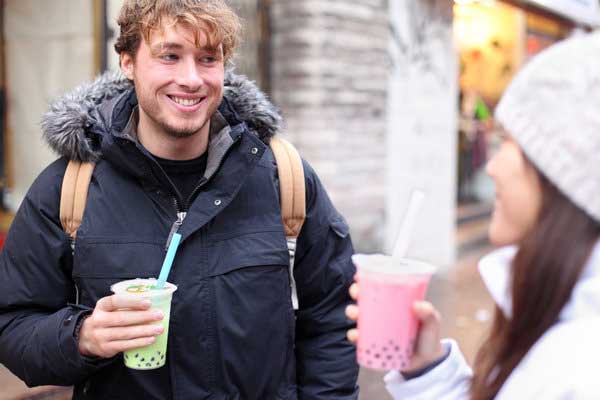Bubble tea, also known as boba tea, has become a global phenomenon, especially among Millennials and Gen Z. While its origins can be traced back to Taiwan in the 1980s, it was two Chinese brothers from central China that built bubble tea into a multi-billion dollar business.

Humble Beginnings Selling Shaved Ice
In 1993, Jiang Hongchao was just 21 years old when he borrowed money from his grandmother to open a small stall selling shaved ice treats in Zhengzhou, the capital of Henan province in central China. That first store didn’t succeed, but two years later in 1995, Jiang tried again. He opened a second shaved ice stall, this time named Mishu Bingchang, meaning “Sweet Snow Palace.”
Over time, the business took off as Jiang shifted from selling just shaved ice to offering ice cream and later bubble tea, lemonade, and coffee drinks at extremely low prices. Now, Mishu Bingchang, which has around 36,000 stores and is China’s biggest bubble tea maker, is on the verge of going public. Jiang, now 47, and his younger brother Jiang Hongfu, 39, are set to become billionaires.
From Shaved Ice to Serving Billions of Cups of Bubble Tea
According to Forbes’ estimates, Mishu Bingchang is worth $2.9 billion. With each brother currently holding a 42.8% stake in the business, their net worth is an estimated $1.2 billion each.
The privately held bubble tea maker last raised money in January 2021, during the funding bubble, pulling in $329 million at a $3.3 billion valuation from investors including billionaire Lei Jun’s Hillhouse Capital and Dragon Ball Capital, the venture arm of billionaire Wang Xing’s Meituan.
Mishu filed for a $915 million IPO in Shenzhen back in 2022 but it never materialized. Now, Mishu has filed for an initial public offering in Hong Kong, revealing the ownership details and rapid growth of the company.
In the first 9 months of 2022, Mishu’s revenue jumped 46% to $2.2 billion and its net profits jumped 48% to $338 million.
Mishu, which has 32,000 stores nearly all franchised in China and another 4,000 in 11 other mostly Asian countries, didn’t respond to a request for comment on the company’s valuation or the brothers’ net worths.
According to the prospectus, its stores sold about 5.8 billion drinks worldwide during the first 9 months of 2022, making it the second biggest global seller of freshly made drinks by cups sold, according to China Insights Consultancy. The number one seller is Starbucks.
Secret to Success: Dirt Cheap Prices
The company stands out in the crowded bubble tea market for its bargain basement prices, earning the nickname “Pinduoduo of bubble tea” after billionaire Colin Huang’s popular Chinese discount e-commerce platform Pinduoduo.
Mishu’s products, which also include freshly made lemonade, soft serve ice cream, fruit tea, and coffee, cost between 3 cents – roughly the price of a can of Coke in China – and $1.
That compares with the average price of $3.80 that Nayuki, another popular Chinese bubble tea chain listed in Hong Kong, charges for its drinks.
Mishu has said it is able to keep its prices low because of its end-to-end supply chain covering everything from procurement and ingredient production to logistics, research and development, and quality control.
Nearly all of its revenue and profits meanwhile come from sales of supplies such as kitchen appliances and food ingredients to franchisees.
Riding the Wave of Bubble Tea’s Popularity
The Jiang brothers are the latest to make their fortune from bubble tea, which is popular among Millennials and Gen Z in Asia and the U.S.
Other bubble tea billionaires include Wang Xuehong, the founder and chairman of Chatime; Pang Xin and Qian Lin, the husband and wife team behind Mishu’s rival Nayuki.
Pang and Qian became billionaires after Nayuki’s Hong Kong IPO in 2021 but the pair has since dropped out of the billionaire ranks following an 80% plunge in the share price triggered by food safety issues.
Conclusion
The incredible success of Mishu Bingchang shows how two entrepreneurial brothers were able to turn a humble shaved ice stall into a multi-billion dollar bubble tea empire in just over 25 years.
By offering cheap prices and expanding quickly through franchising, the Jiang brothers now sell billions of bubble tea drinks across China and internationally each year. Their pending IPO is set to cement their status as billionaires.
It remains to be seen whether Mishu can maintain its explosive growth and market share in the increasingly competitive bubble tea industry. But for now, the company’s rise from street stall to global dominance is a testament to the power of disruptive innovation and knowing your customer.
